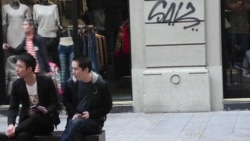MILAN —
The economic crisis in Italy has left many small businesses in dire straits. Unable to get credit and with little hope of an economic recovery, increasing numbers of entrepreneurs are looking to sell their businesses to Chinese investors.
Laura Zanardi and Monica Borlini opened a bar-café thirteen years ago in the northern wine region of Franciacorta.
“It was just an empty rectangular warehouse. We redid it, building a mezzanine and creating more intimate areas. It was a ton of work, demanding both economically and in terms of hours of work. But it also gave us a lot of satisfaction. It's our baby,” recalled Zanardi.
Now, the two partners are ready to sell.
They say that the economic crisis has taken a toll on the customers and on the bar's profits.
“It is much more difficult now, more demanding. It used to be easy, money moved around. Now they are all very careful, you have to stay up until morning and try to give them good fun, a night not to think about their economic problems,” said Borlini.
They are trying to sell their business through a website called “vendereaicinesi.it” - literally “sell to the Chinese.”
Simone Toppino is the co-founder of the website that helps translate and distribute ads targeting Chinese buyers.
“We started this year in mid-February. At the beginning it was just a translator and a web-developer. It was a success right away, and now we have eleven employees, with four translators. There are lots of ads and lots of work for us,” said Toppino.
Since Europe’s economic crisis began, pinching business throughout the region, there has been a steady increase in the number of Chinese opening up shop in Italy. A recent study estimates the number of Chinese-backed businesses in Italy has risen by 34 percent in recent years.
Angelo Ou, the representative of the Chinese business community in Milan, says Chinese investment in Italy is changing.
“There is a change towards the service industry. In the past most businesses were in small manufacturing, so for example in ready to wear, fast fashion manufacturing. But now there is more in the servicing sector. At first the response locally was - and to some extent still is - of rejection. ‘These Chinese buy everything, even the town's bar that has been in the hands of an Italian family for three generations. What do Chinese people know about how to operate a café?’” said Ou.
With time, Ou thinks, having more Chinese working in Italy’s service sector will help with integration.
Zanardi and Borlini’s café is listed for sale for $1.4 million. The Chinese entrepreneurs who have come to see the space so far say it's too big of an investment for them. Nonetheless, the owners remain optimistic that the right buyer will come along eventually.
Laura Zanardi and Monica Borlini opened a bar-café thirteen years ago in the northern wine region of Franciacorta.
“It was just an empty rectangular warehouse. We redid it, building a mezzanine and creating more intimate areas. It was a ton of work, demanding both economically and in terms of hours of work. But it also gave us a lot of satisfaction. It's our baby,” recalled Zanardi.
Now, the two partners are ready to sell.
They say that the economic crisis has taken a toll on the customers and on the bar's profits.
“It is much more difficult now, more demanding. It used to be easy, money moved around. Now they are all very careful, you have to stay up until morning and try to give them good fun, a night not to think about their economic problems,” said Borlini.
They are trying to sell their business through a website called “vendereaicinesi.it” - literally “sell to the Chinese.”
Simone Toppino is the co-founder of the website that helps translate and distribute ads targeting Chinese buyers.
“We started this year in mid-February. At the beginning it was just a translator and a web-developer. It was a success right away, and now we have eleven employees, with four translators. There are lots of ads and lots of work for us,” said Toppino.
Since Europe’s economic crisis began, pinching business throughout the region, there has been a steady increase in the number of Chinese opening up shop in Italy. A recent study estimates the number of Chinese-backed businesses in Italy has risen by 34 percent in recent years.
Angelo Ou, the representative of the Chinese business community in Milan, says Chinese investment in Italy is changing.
“There is a change towards the service industry. In the past most businesses were in small manufacturing, so for example in ready to wear, fast fashion manufacturing. But now there is more in the servicing sector. At first the response locally was - and to some extent still is - of rejection. ‘These Chinese buy everything, even the town's bar that has been in the hands of an Italian family for three generations. What do Chinese people know about how to operate a café?’” said Ou.
With time, Ou thinks, having more Chinese working in Italy’s service sector will help with integration.
Zanardi and Borlini’s café is listed for sale for $1.4 million. The Chinese entrepreneurs who have come to see the space so far say it's too big of an investment for them. Nonetheless, the owners remain optimistic that the right buyer will come along eventually.





